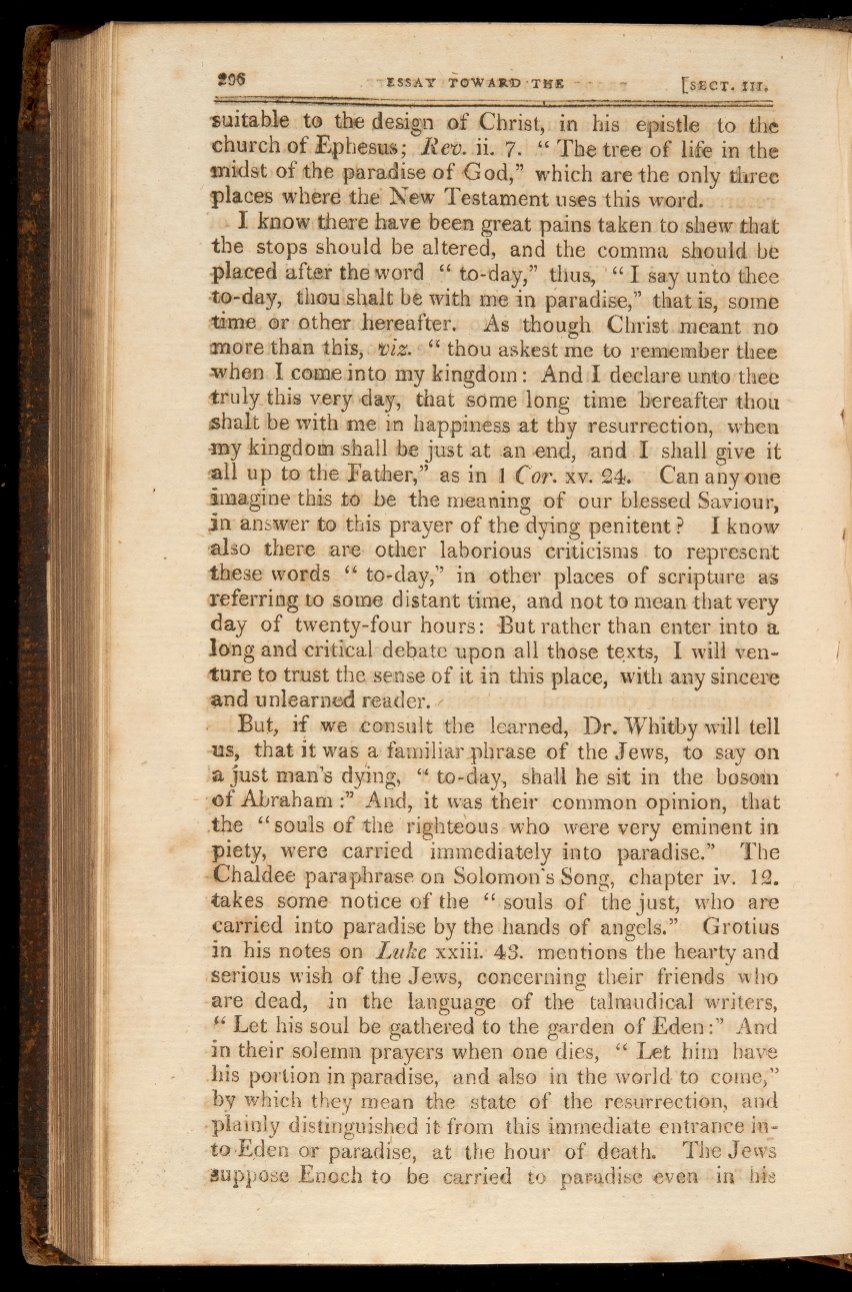

rNS
ESSAY
icrW
Amp THE
[SECT.
M.
Suitable
to the design
of
Christ,
in his
epistle
to the
church of Ephesus;
Rev.
ii. 7.
"
The tree of
life
in
the
midst of the
paradise
of
nod,"
which
are the
only
three
places
where
the New Testament
uses
this word.
I
know there
have
been
great
pains taken
to spew
that
the
stops should
be
altered, and
the comma should
be
placed after
the word
"
to-day,"
thus, "
I
sa.y
unto
thee
to
-day,
thou shalt
be with me
in
paradise,"
that
is,
some
time or other hereafter.
As
though
Christ
meant
no
more
than
this,
viz.
"
thou askest me
to
remember thee
.vhen
I
come
into
my
kingdom
:
And
I declare
unto thee
truly
this very
day,
that
some long time
hereafter thou
shalt
be with me
in
happiness
at
thy
resurrection,
when
my
kingdom shall
be
just
at
an
end,
and
I
shall
give
it
fall
up
to
the
Father,"
as
in
1
Cor.
xv.
24.
Can
anyone
imagine
this
to be
the
meaning
of
our
blessed Saviour,
in
answer
to this
prayer of the
dying
penitent
?
I
know
also
there are
other laborious
criticisms
to
represent
these
words
"
to -day,"
in
other
places
of
scripture
as
referring
to some
distant
time,
and
not
to mean
that
very
day
of
twenty
-four hours:
But
rather than enter
into
a
long
and critical debate upon
all those texts,
I
will
ven-
ture
to
trust
the sense
of
it
in
this place, with
any
sincere
and unlearned
reader.
But,
if
we
consult the
learned,
Dr.
Whitby
will
tell
us,
that it
was a
familiar phrase
of
the Jews,
to
say
on
a just
man's
dying,
to
-day,
shall he
sit
in
the
bosom
of
Abraham
:"
And, it
was
their
common opinion,
that
the
"souls
of the
righteous
who
were very
eminent
in
piety, were
carried
immediately into paradise."
The
Chaldee paraphrase
on
Solomon's
Song,
chapter
iv. 12,
takes
some
notice
of
the
"souls
of
the
just,
who
are
carried into paradise
by
the
hands of angels."
Grotius
in
his
notes
on
Luke
xxiii.
43.
mentions the hearty
and
serious
wish
of
the Jews,
concerning their friends
who
are
dead,
in the language
of
the talnaudical writers,
Let
his soul
be
gathered
to
the garden
of Eden
:"
And
in
their
solemn
prayers
when
one
dies,
"
Let
him have
his
portion
in
paradise, and also
in
the world
to
come,"
by which they
mean the state
of
the
resurrection, and
plainly distinguished
it
from this immediate
entrance
in-
to,Eden
or
paradise,
at
the
hour of
death. The Jews
suppose
Enoch
to
be
carried
to
paradise even
in his

















